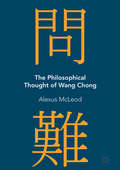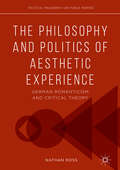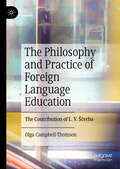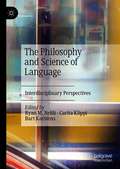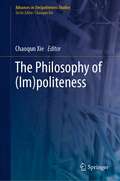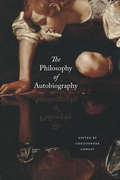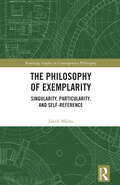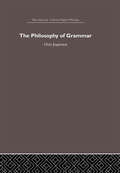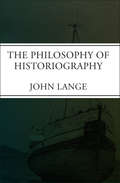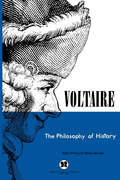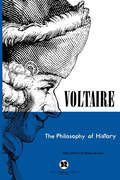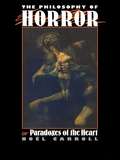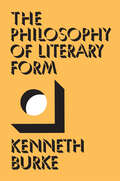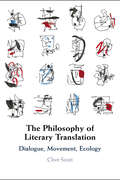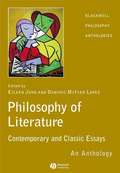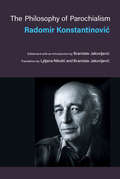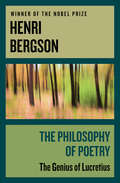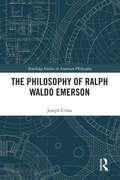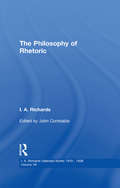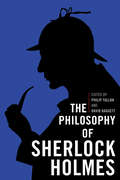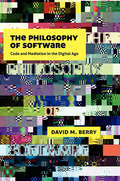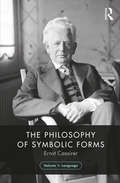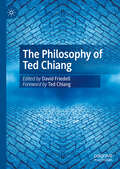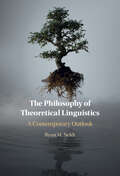- Table View
- List View
The Philosophical Thought of Wang Chong
by Alexus McLeodThis book is a study of the methodological, metaphysical, and epistemological work of the Eastern Han Dynasty period scholar Wang Chong. It presents Wang’s philosophical thought as a unique and syncretic culmination of a number of ideas developed in earlier Han and Warring States philosophy. Wang’s philosophical methodology and his theories of truth, knowledge, and will and determinism offer solutions to a number of problems in the early Chinese tradition. His views also have much to offer contemporary philosophy, suggesting new ways of thinking about familiar problems. While Wang is best known as a critic and skeptic, Alexus McLeod argues that these aspects of his thought form only a part of a larger positive project, aimed at discerning truth in a variety of senses.
The Philosophy and Politics of Aesthetic Experience
by Nathan RossThis book develops a philosophy of aesthetic experience through two socially significant philosophical movements: early German Romanticism and early critical theory. In examining the relationship between these two closely intertwined movements, we see that aesthetic experience is not merely a passive response to art--it is the capacity to cultivate true personal autonomy, and to critique the social and political context of our lives. Art is political for these thinkers, not only when it paints a picture of society, but even more when it makes us aware of our deeply ingrained forms of experience in a transformative way. Ultimately, the book argues that we have to think of art as a form of truth that is not reducible to communicative rationality or scientific knowledge, and from which philosophy and politics can learn valuable lessons.
The Philosophy and Practice of Foreign Language Education: The Contribution of L. V. Ščerba
by Olga Campbell-ThomsonThis volume brings the writings of Russian linguist Lev Vladimirovič Ščerba (1880–1944) to English-language readers for the first time. The collection includes key essays in which Ščerba addresses the issues of educational methodology for foreign languages, contextualised with a critical introduction and commentary, as well as an extensive bibliography of further reading. In the historical context of linguistic scholarship, Ščerba’s work is closely interlinked with major developments in the field of modern language studies in Western Europe at the turn of the twentieth century as well as with the Russian educational tradition. By studying Ščerba’s writing, it is possible to trace the foundational linguistic impetus for the development of this field of scholarship, as well as educational concerns that have since been integrated in the programme of modern language studies. The ideas advanced in Ščerba’s texts remain directly relevant today to policy-makers, teacher trainers, methodologists, and foreign language practitioners. They should be of particular interest to readers in Anglophone countries where foreign languages remain on the periphery of all levels of education. This book will enable English language readers to engage in their own critical reflection on Ščerba’s texts.
The Philosophy and Science of Language: Interdisciplinary Perspectives
by Ryan M. Nefdt Carita Klippi Bart KarstensThis volume brings together a diverse range of scholars to address important philosophical and interdisciplinary questions in the study of language. Linguistics throughout history has been a conduit to the study of the mind, brain, societal structure, literature and history itself. The epistemic and methodological transfer between the sciences and humanities in regards to linguistics has often been documented, but the underlying philosophical issues have not always been adequately addressed. With 15 original and interdisciplinary chapters, this volume therefore tackles vital questions relating to the philosophy, history, and theoretical interplay between the study of language and fields as varied as logic, physics, biology, classical philology and neuroscience. With a four part structure, questions of the mathematical foundations of linguistics, links to the natural sciences, cognitive implications and historical connections, take centre stage throughout the volume. The final chapters present research related to the linguistic connections between history, philosophy and the humanities more broadly. Advancing new avenues of research, this volume is exemplary in its treatment of diachronic and cross-disciplinary interaction, and will be of interest to all scholars interested in the study of language.
The Philosophy of (Advances in (Im)politeness Studies)
by Chaoqun XieThis book explores what new light philosophical approaches shed on a deeper understanding of (im)politeness. There have been numerous studies on linguistic (im)politeness, however, little attention has been paid to its philosophical underpinnings. This book opens new avenues for both (im)politeness and philosophy. It contributes to a fruitful dialogue among philosophy, pragmatics, and sociology. This volume appeals to students and researchers in these fields.
The Philosophy of Autobiography
by Christopher CowleyWe are living through a boom in autobiographical writing. Every half-famous celebrity, every politician, every sports hero--even the non-famous, nowadays, pour out pages and pages, Facebook post after Facebook post, about themselves. Literary theorists have noticed, as the genres of "creative nonfiction" and "life writing" have found their purchase in the academy. And of course psychologists have long been interested in self-disclosure. But where have the philosophers been? With this volume, Christopher Cowley brings them into the conversation. Cowley and his contributors show that while philosophers have seemed uninterested in autobiography, they have actually long been preoccupied with many of its conceptual elements, issues such as the nature of the self, the problems of interpretation and understanding, the paradoxes of self-deception, and the meaning and narrative structure of human life. But rarely have philosophers brought these together into an overarching question about what it means to tell one's life story or understand another's. Tackling these questions, the contributors explore the relationship between autobiography and literature; between story-telling, knowledge, and agency; and between the past and the present, along the way engaging such issues as autobiographical ethics and the duty of writing. The result bridges long-standing debates and illuminates fascinating new philosophical and literary issues.
The Philosophy of Exemplarity: Singularity, Particularity, and Self-Reference (Routledge Studies in Contemporary Philosophy)
by Jakub MáchaThis book offers an original philosophical perspective on exemplarity. Inspired by Wittgenstein’s later work and Derrida’s theory of deconstruction, it argues that examples are not static entities but rather oscillate between singular and universal moments. There is a broad consensus that exemplary cases mediate between singular instances and universal concepts or norms. In the first part of the book, Mácha contends that there is a kind of différance between singular examples and general exemplars or paradigms. Every example is, in part, also an exemplar, and vice versa. Furthermore, he develops a paracomplete approach to the logic of exemplarity, which allows us to say of an exemplar of X neither that it is an X nor that it is not an X. This paradox is structurally isomorphic to Russell’s paradox and can be addressed in similar ways. In the second part of the book, Mácha presents four historical studies that exemplify the ideas developed in the first part. This part begins with Plato’s Forms, understood as standards/paradigms, before considering Kant’s theory of reflective judgment as a general epistemological account of exemplarity. This is then followed by analyses of Hegel’s conceptual moment of particularity and Kuhn’s concept of paradigm. The book concludes by discussing the speculative hypothesis that all our knowledge is based on paradigms, which, following the logic of exemplarity, are neither true nor false. The Philosophy of Exemplarity will be of interest to scholars and advanced students working in philosophy of language, logic, history of philosophy, and literary theory.
The Philosophy of Historiography
by John LangeA philosophical examination of the study of history, from its logic and semantics to its metaphysical and epistemological implications. This book is intended for the highly intelligent reader, who is interested in considering the difficulties, problems, and challenges of understanding and writing about the human past. It is popularly enough written, hopefully, to be a joy to read, and scholarly enough to be seriously instructive. The book has two major purposes, first, to give a reader an extensive, detailed overview of the field as it currently exists, and, second, to considerably enlarge the field itself, as it is the first book in the area to consider not only the epistemology of the field, but, in detail, its logic and semantics, its metaphysics, its axiology and its aesthetics.
The Philosophy of History
by Voltaire Thomas KiernanHave you ever wondered how different worldviews have shaped history? How dominant religious or political groups have changed the way past events have been interpreted, written, and recorded? Voltaire, the greatest philosophical mind to come out of the Enlightenment, has tackled these very questions in his essay The Philosophy of History. Voltaire attempts to reinterpret the moral, aesthetic, and religious views and the customs and practices that prevailed in ancient civilizations. In The Philosophy of History, he takes a philosophical look through history from different races of man to legislators who have spoken in the name of the Gods. This enthralling essay is an essential read for scholars and students of the Enlightenment. The Philosophy of History was first published in London in 1776 and is a typical representation of Voltaire's attitude toward life and reality. His prime concern was to disprove and demolish the established notions that governed contemporary affairs; they were, in his penetrating view, patently ridiculous. He spread his iconoclastic aim throughout his work. The model for all subsequent dissenters, Voltaire wrote with courage and conviction most importantly, with controlled genius that lent to his words and ideas a strength and aggregate that has resisted the erosive influence of time. This ebook is derived from the original edition published in 1776, with a preface by Thomas Kiernan
The Philosophy of History: Or A Philosophical And Historical Dissertation, On The Origin, Manners, Customs, And Religion Of The Different Nations, And People Of Antiquity
by VoltaireThe great Enlightenment thinker shares his views on the nature and practice of history in this fascinating critique of historical narratives. In The Philosophy of History, Voltaire present a radical reinterpretation of the moral, aesthetic, and religious views and the customs and practices that prevailed in ancient civilizations. His critique touches on a range of topics, from cultures across the globe to legislators who spoke in the name of the gods. This enthralling essay is an essential read for scholars and students of the Enlightenment. This ebook is derived from the original edition published in 1776, with a preface by Thomas Kiernan.
The Philosophy of Horror: Or, Paradoxes of the Heart
by Noel CarrollNoel Carroll, film scholar and philosopher, offers the first serious look at the aesthetics of horror. In this book he discusses the nature and narrative structures of the genre, dealing with horror as a "transmedia" phenomenon. A fan and serious student of the horror genre, Carroll brings to bear his comprehensive knowledge of obscure and forgotten works, as well as of the horror masterpieces. Working from a philosophical perspective, he tries to account for how people can find pleasure in having their wits scared out of them. What, after all, are those "paradoxes of the heart" that make us want to be horrified?
The Philosophy of Literary Form: Studies In Symbolic Action (classic Reprint)
by Kenneth BurkeFrom the ForewordThese pieces are selections from work done in the Thirties, a decade so changeable that I at first thought of assembling them under the title, "While Everything Flows." Their primary interest is in speculation on the nature of linguistic, or symbolic, or literary action--and in a search for more precise ways of locating or defining such action. Words are aspects of a much wider communicative context, most of which is not verbal at all. Yet words also have a nature peculiarly their own. And when discussing them as modes of action, we must consider both this nature as words in themselves and the nature they get from the non-verbal scenes that support their acts. I shall be happy if the reader can say of this book that, while always considering words as acts upon a scene, it avoids the excess of environmentalist schools which are usually so eager to trace the relationships between act and scene that they neglect to trace the structure of the act itself.
The Philosophy of Literary Translation: Dialogue, Movement, Ecology
by Clive ScottWhile reading transforms texts through memories, associations and re-imaginings, translation allows us to act out our reading experience, inscribe it in a new text, and engage in a dialogic and dynamic relationship with the original. In this highly original new study, Clive Scott reveals the existential and ecological values that literary translation can embody in its perceptual transformation of texts. The transfer of a text from one language into another is merely the platform from which translation launches its larger ambitions, including the existential expansion and re-situation of text towards new expressive futures and ways of inhabiting the world. Recasting language as a living organism and as part of humanity's ongoing duration, this study uncovers its tireless capacity to cross perceptual boundaries, to multiply relations between the human and the non-human and to engage with forms of language which evoke unfamiliar modes of psycho-perception and eco-modelling.
The Philosophy of Literature: Contemporary and Classic Readings - An Anthology
by Eileen John Dominic Mciver LopesThis anthology contains forty-five substantial and carefully chosen essays and extracts and provides a coherent overview of developments in the field including influential work on fiction, interpretation, metaphor and literary value.
The Philosophy of Parochialism
by Radomir KonstantinovicThe Philosophy of Parochialism is Radomir Konstantinovic’s (1928–2011) most celebrated and reviled book. First published in Belgrade as Filosofija palanke in 1969, it attracted keen attention and controversy through its unsparing critique of Serbian and any other nationalism in Yugoslavia and beyond. The book was prophetic, seeming to anticipate not only the bloody disintegration of Yugoslavia in the 1990s, but also the totalitarian turn in politics across the globe in the first decades of the new century. With this translation, English-speaking audiences can at last discover one of the most original writers of eastern European late modernism, and gain an important and original perspective into contemporary politics and culture in the West and beyond. This is a book that seems to age in reverse, as its meanings become deeper and more universal with the passage of time. Konstantinovic’sbookresists easy classification, mixing classical, Montaigne-like essay, prose poetry, novel, and literary history. The word “philosophy” in the book’s title refers to the solitary activity of reflection and critical thinking, and is also paradoxical: according to the author, a defining characteristic of parochialism is precisely its intolerance toward this kind of self-reflexivity. In Konstantinovic’s analysis, parochialism is not a simply a characteristic of a geographical region or a cultural, political, and historical formation—these are all just manifestations of the parochial spirit as the spirit of insularity. His book illuminates the current moment, in which insularity undergirds not only ethnic and national divisions, but also dictates the very structure of everyday life, and where individuals can easily find themselves locked in an echo chamber of social media. The Philosophy of Parochialism can help us understand better not only the dead ends of ethnic nationalism and other atavistic ideologies, but also of those cultural forces such as digital technologies that have been built on the promise of overcoming those ideologies.
The Philosophy of Poetry: The Genius of Lucretius
by Henri BergsonThis is a partial translation by Wade Baskin of the original French work Ecrits et Paroles (a 3 volume set, 665 pages) published between 1957 and 1959 by Henri Bergson. It includes the translation from Bergson&’s introduction to a French ed. of De rerum natura, by Lucretius published in 1884 under the title: Extraits de Lucre`ce.
The Philosophy of Poetry: The Genius of Lucretius
by Henri BergsonThis is a partial translation by Wade Baskin of the original French work Ecrits et Paroles (a 3 volume set, 665 pages) published between 1957 and 1959 by Henri Bergson. It includes the translation from Bergson&’s introduction to a French ed. of De rerum natura, by Lucretius published in 1884 under the title: Extraits de Lucre`ce.
The Philosophy of Ralph Waldo Emerson (Routledge Studies in American Philosophy)
by Joseph UrbasThis study offers the first comprehensive account of Emerson's philosophy since his philosophical rehabilitation began in the late 1970s. It builds on the historical reconstruction proposed in the author's previous book, Emerson's Metaphysics, and like that study draws on the entire Emerson corpus—the poetry and sermons included. The aim here is expository. The overall though not exclusive emphasis is on identity, as the first term of Emerson's metaphysics of identity and flowing or metamorphosis. This metaphysics, or general conception of the nature of reality, is what grounds his epistemology and ethics, as well as his esthetic, religious, and political thought. Acknowledging its primacy enables a general account like this to avoid the anti-realist overemphasis on epistemology and language that has often characterized rehabilitation readings of his philosophy. After an initial chapter on Emerson's metaphysics, the subsequent chapters devoted to the other branches of his thought also begin with their "necessary foundation" in identity, which is the law of things and the law of mind alike. Perception of identity in metamorphosis is what characterizes the philosopher, the poet, the scientist, the reformer, and the man of faith and virtue. Identity of mind and world is felt in what Emerson calls the moral sentiment. Identity is Emerson's answer to the Sphinx-riddle of life experienced as a puzzling succession of facts and events.
The Philosophy of Rhetoric V7
by I. A. RichardsThis is Volume seven in a collection of ten of the Selected Works of I.A. Richards. Perhaps since his death the most widely known of all Richards' books, certainly the most read, The Philosophy of Rhetoric 1936 is a simplified treatment of the major theoretical concerns of Interpretation in Teaching.
The Philosophy of Sherlock Holmes (The Philosophy of Popular Culture)
by Philip Tallon and David BaggettEssays about the famed fictional detective and the mysteries of life: &“Both elegantly erudite and consistently entertaining&” (E. J. Wagner, Edgar Award–winning author of The Science of Sherlock Holmes). Sir Arthur Conan Doyle&’s detective has stood as a unique figure for more than a century with his reliance on logical rigor, his analytic precision, and his disregard of social mores. A true classic, the Sherlock Holmes character continues to entertain twenty-first-century audiences on the page, stage, and screen. In The Philosophy of Sherlock Holmes, a team of leading scholars uses the beloved character as a window into the quandaries of existence, from questions of reality to the search for knowledge. The essays explore the sleuth&’s role in revealing some of the world's most fundamental philosophical issues, discussing subjects such as the nature of deception, the lessons enemies can teach us, Holmes&’s own potential for criminality, and the detective&’s unique but effective style of inductive reasoning. Emphasizing the philosophical debates raised by generations of devoted fans, this intriguing volume will be of interest to philosophers and Holmes enthusiasts alike.
The Philosophy of Software: Code and Mediation in the Digital Age
by D. BerryThis book is a critical introduction to code and software that develops an understanding of its social and philosophical implications in the digital age. Written specifically for people interested in the subject from a non-technical background, the book provides a lively and interesting analysis of these new media forms.
The Philosophy of Symbolic Forms, Volume 1: Language (The Philosophy of Symbolic Forms)
by Ernst Cassirer"The Philosophy of Symbolic Forms is a milestone in twentieth century philosophy. Promoting a philosophical vision informed by Kant, it incorporates the philosophical advances achieved in the nineteenth century by German Idealism and Neo-Kantianism, whilst acknowledging the contributions made by his contemporary phenomenologists. It also encompasses empirical and historical research on culture and the most contemporary work on myth, linguistics and psychopathology. As such, it ranks in philosophical importance along with other major works of the twentieth century, such as Edmund Husserl’s Logical Investigations, Martin Heidegger’s Being and Time, and Ludwig Wittgenstein’s Tractatus Logico-Philosophicus.In the first volume, Cassirer explores the symbolic form of language. Already recognized by thinkers in the tradition of German Idealism, such as Wilhelm von Humboldt, language is the primary medium by which we interact with others and form a common world. As Cassirer emphasizes in the famous Davos Debate with Heidegger, 'there is one objective human world, in which a bridge is built from individual to individual. That I find in the primal phenomenon of language.' The famous trias Cassirer discerns in the functioning of language – the functions of expression (Ausdruck), presentation (Darstellung), and signification (Bedeutung) – has become paradigmatic for accounts of language, philosophical, linguistic, and anthropological alike."Sebastian Luft, Professor of Philosophy, Marquette University, USA.This new translation makes Cassirer’s seminal work available to a new generation of scholars. Each volume includes a translator’s introduction by Steve G. Lofts, a foreword by Peter E. Gordon, a glossary of key terms, and an index.
The Philosophy of Ted Chiang
by David FriedellTed Chiang is one of the most insightful science fiction writers of our time. His writing has garnered high praise, including four Nebula awards, four Hugo awards and the John W. Campbell Award for Best New Writer. His short story, “Story of Your Life,” was the basis of the 2016 film Arrival. This volume, which includes a foreword by Chiang and twenty-one short essays by philosophers, analyzes the philosophical significance of Chiang’s popular science fiction. These essays discuss how Chiang’s stories engage with age-old and contemporary philosophical questions pertaining to free will, God, technology, existentialism, beauty, procreation, contradictions, time, human intelligence, alien intelligence, and artificial intelligence. This volume probes terrain that should be of interest to experts in philosophy, while still being accessible to a general audience interested in science fiction. These essays, like Ted Chiang’s writing, demonstrate how excellent science fiction can help us to think about the world and our place in it.
The Philosophy of Theoretical Linguistics: A Contemporary Outlook
by Ryan M. NefdtWhat is the remit of theoretical linguistics? How are human languages different from animal calls or artificial languages? What philosophical insights about language can be gleaned from phonology, pragmatics, probabilistic linguistics, and deep learning? This book addresses the current philosophical issues at the heart of theoretical linguistics, which are widely debated not only by linguists, but also philosophers, psychologists, and computer scientists. It delves into hitherto uncharted territory, putting philosophy in direct conversation with phonology, sign language studies, supersemantics, computational linguistics, and language evolution. A range of theoretical positions are covered, from optimality theory and autosegmental phonology to generative syntax, dynamic semantics, and natural language processing with deep learning techniques. By both unwinding the complexities of natural language and delving into the nature of the science that studies it, this book ultimately improves our tools of discovery aimed at one of the most essential features of our humanity, our language.
